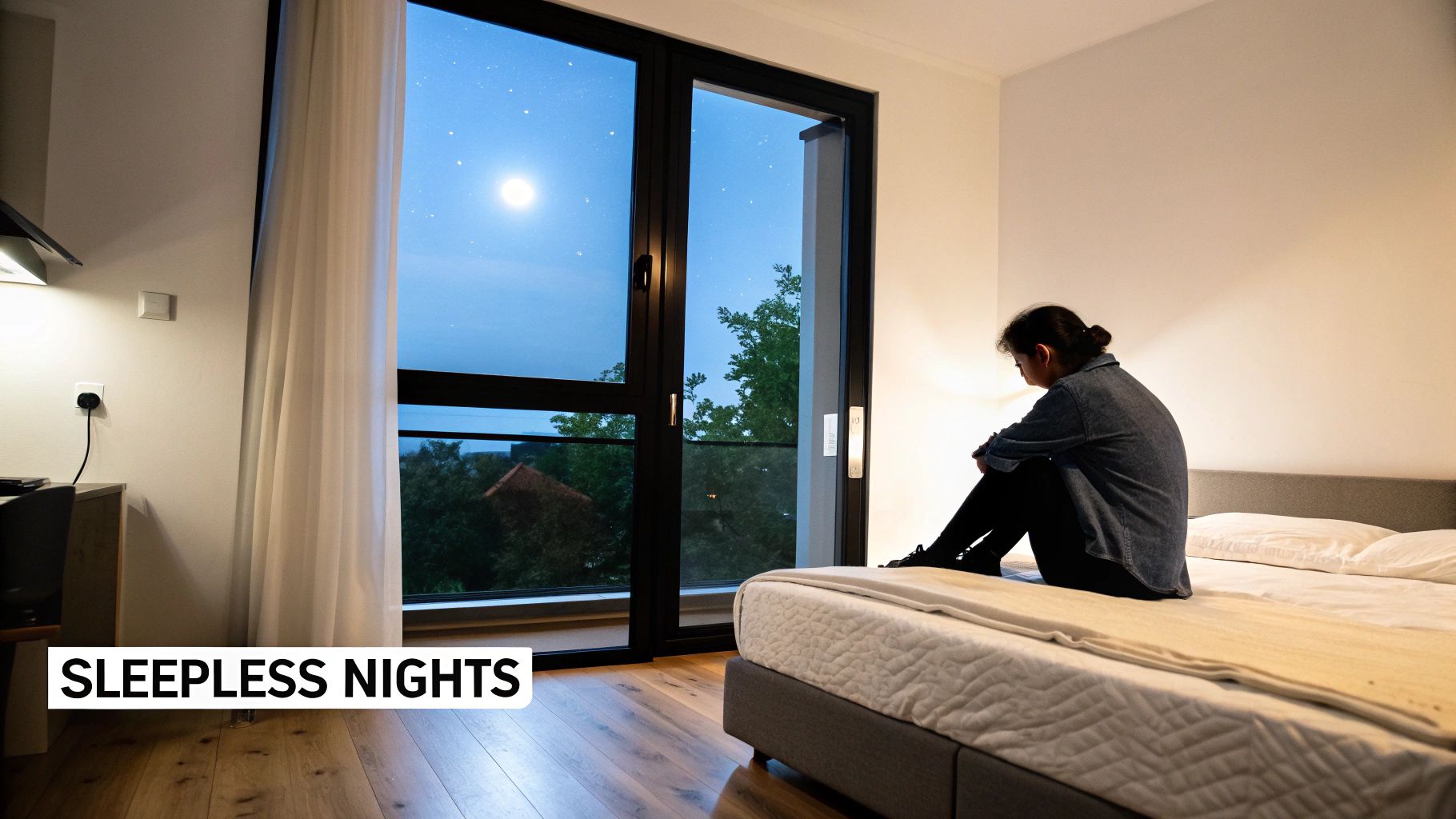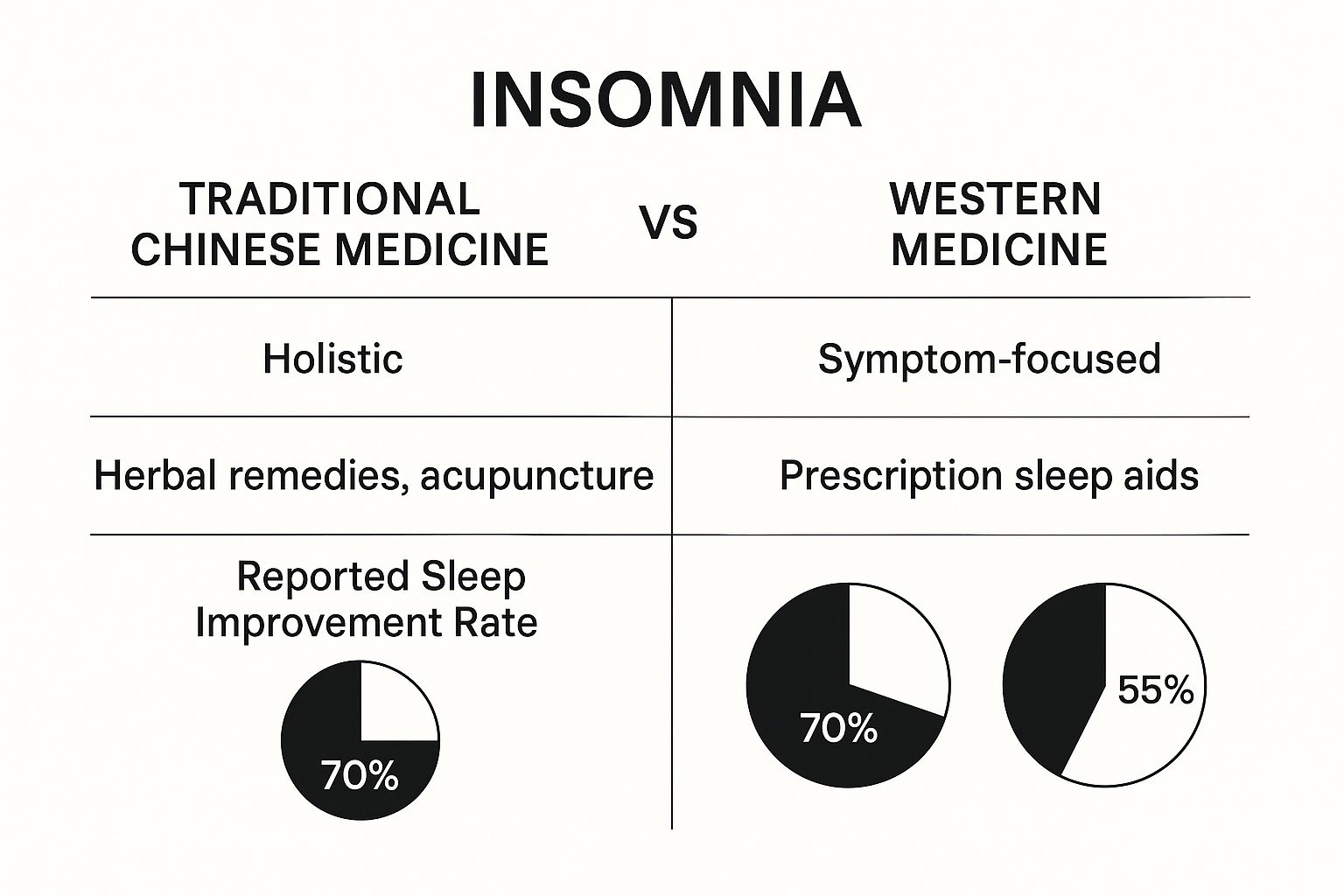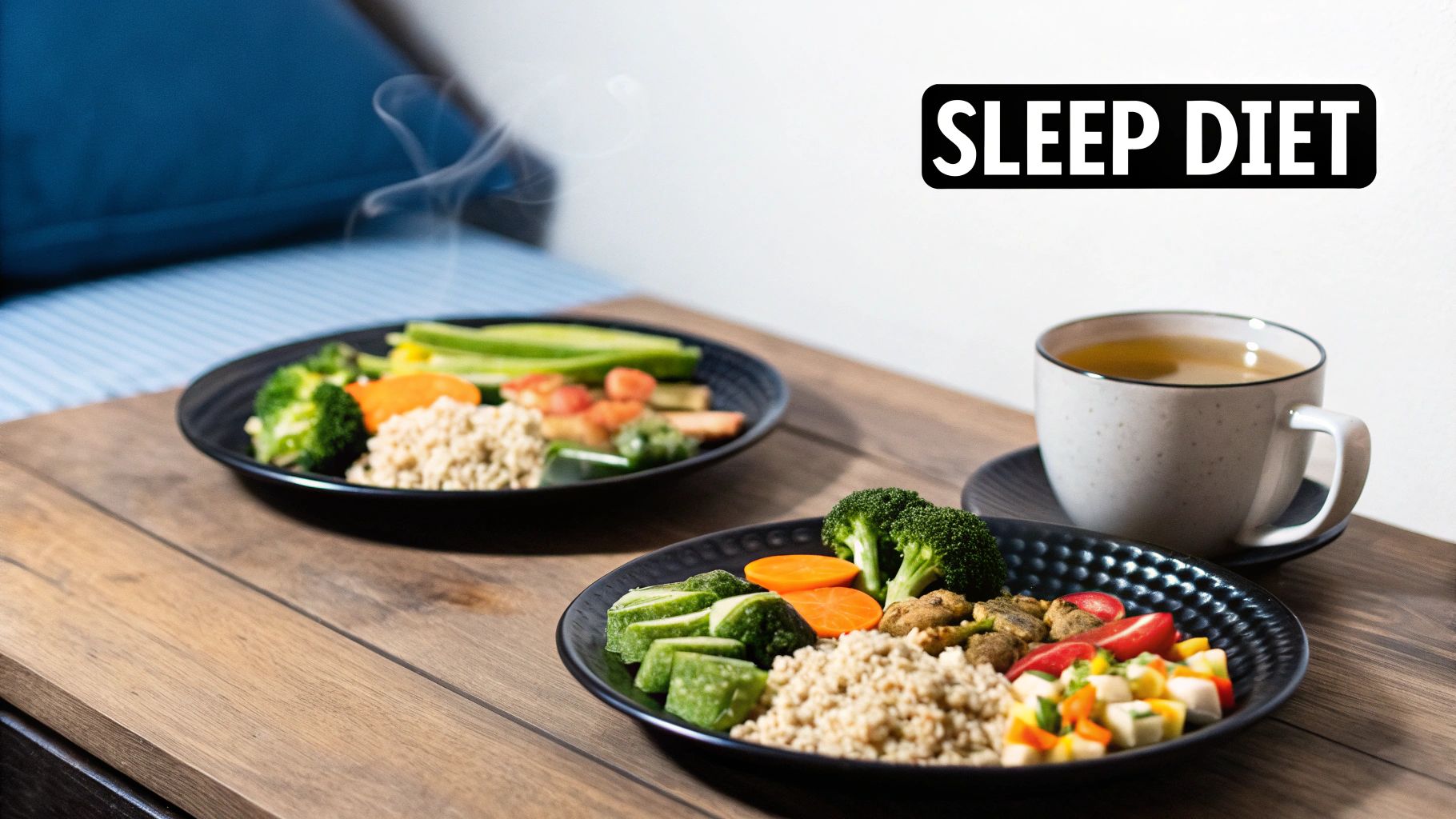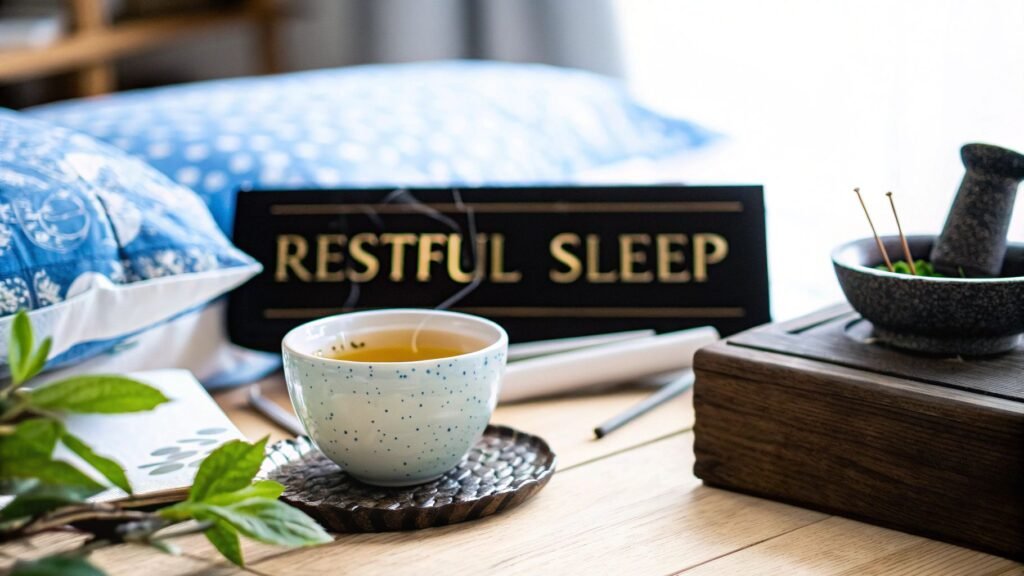If you've spent countless nights staring at the ceiling, you've probably wondered if there's a better way to find rest. Chinese medicine offers a profoundly different approach to insomnia, seeing it not as a sleep switch that’s broken, but as a clear signal that your body is out of balance. Using herbs, acupuncture, and simple lifestyle adjustments, it aims to restore your natural sleep rhythm from the inside out.
How Chinese Medicine Views Insomnia

In the world of Traditional Chinese Medicine (TCM), sleep isn't just about being tired enough. It's a delicate dance between your active, daytime energy (Yang) and your quiet, restorative nighttime energy (Yin). When these two are in sync, sleep feels natural and deeply refreshing.
Think of your conscious mind, what we call the Shen (or Spirit), as a boat. To fall asleep, that boat needs to return to a peaceful harbor for the night. This harbor is built from healthy blood and Yin fluids, with the Heart organ system acting as the main anchor.
The Mind Adrift at Night
When certain organ systems are out of whack, they can't create that calm harbor. The boat of your mind is left adrift on a restless sea, unable to settle. This is the very essence of how TCM explains insomnia—it's not a standalone problem but a symptom of a deeper disharmony.
A few key players are responsible for maintaining this delicate balance:
- The Heart: In TCM, the Heart is said to "house the Shen." If the Heart's blood or Yin is weak, it can’t properly anchor the mind. This often shows up as difficulty falling asleep, a racing heart, anxiety, or unsettlingly vivid dreams.
- The Liver: The Liver ensures the smooth flow of Qi (your vital energy) and stores the blood. When stress causes Liver Qi to get stuck or flare up as "Liver Fire," it can agitate the Shen. This is a classic reason for waking up frequently, especially between 1 AM and 3 AM.
- The Kidneys: Think of the Kidneys as the root of all Yin and Yang in the body. If Kidney Yin is depleted, it can generate a kind of "empty heat" that rises up, disturbing the Heart and Shen. This pattern is often accompanied by night sweats and a restless, fidgety feeling in bed.
This perspective treats insomnia not just as a brain issue, but as a whole-body one. By pinpointing which organ system is out of balance, a practitioner can develop a plan to guide your body back to its natural state of rest. You can learn more about these fundamental concepts and explore the basics of TCM in our detailed guide.
A Timeless Approach to a Modern Problem
This isn't some new-age fad; TCM has been successfully treating insomnia for over 2,000 years. Its enduring relevance is clear, especially in places like China, where insomnia affects an estimated 15% of the population.
This widespread struggle has created a huge demand for natural, effective sleep solutions. In fact, China has become a major market for sleep aids, with revenue projected to soar past US$500 million by 2025.
This ancient wisdom gives us a powerful framework for understanding why you might be struggling—whether it’s falling asleep, staying asleep, or having restless dreams—and paves the way for the targeted solutions that TCM can offer.
Finding Your Unique Insomnia Pattern
In Chinese medicine, "insomnia" isn't a single diagnosis. It's more like a check-engine light on your dashboard—a symptom pointing to a deeper, more specific imbalance we call a pattern of disharmony. This is exactly why two people struggling with sleeplessness might walk away with completely different treatments. Their insomnia, while looking similar on the surface, stems from entirely different root causes.
Think of it like being a gardener. If your plants are wilting (insomnia), you wouldn't just paint the leaves green and call it a day. A good gardener looks at the whole picture—the soil, the water, the sunlight—to figure out what’s really wrong. That's the TCM approach. We look beyond the symptom to understand your body's unique internal landscape.
This detailed, personalized diagnostic process is what makes the approach so effective. We move away from a one-size-fits-all pill and toward a strategy designed to restore your body’s own innate ability to find deep, restorative rest.
Common TCM Insomnia Patterns and Their Symptoms
To give you a clearer picture, let's look at some of the most common patterns a practitioner might identify. Each one tells a different story about why you're not sleeping.
| TCM Pattern | Primary Cause | Sleep Symptoms | Daytime Symptoms |
|---|---|---|---|
| Heart & Spleen Deficiency | Overthinking, worry, poor diet depleting Qi and Blood. | Trouble falling asleep; racing thoughts; dream-disturbed, unrefreshing sleep. | Fatigue, poor appetite, pale complexion, forgetfulness, possible heart palpitations. |
| Liver Fire Blazing Upwards | Chronic stress, frustration, anger leading to stuck Qi and Heat. | Waking up frequently (especially 1-3 AM); vivid, angry, or stressful dreams. | Irritability, short temper, headaches, red eyes, bitter taste in the mouth. |
| Yin Deficiency with Empty Heat | Overwork, chronic illness, aging depleting the body’s cooling fluids. | Waking multiple times; night sweats; feeling hot and bothered, especially in chest, palms, and feet. | Dry mouth and throat, anxiety, low back pain, ringing in the ears. |
Remember, these are just common examples. Your experience is unique, and a trained practitioner is the best person to uncover the specific pattern—or combination of patterns—affecting your sleep.
The Overthinking Mind: Heart and Spleen Deficiency
Do you lie in bed at night while your mind runs a marathon, replaying the day's conversations or obsessing over tomorrow's to-do list? This is a classic sign of a pattern called Heart and Spleen Qi Deficiency.
In TCM, the Spleen is our digestive powerhouse, responsible for turning food into the energy (Qi) and Blood that nourishes our entire body. When we weaken the Spleen through overwork, irregular meals, or just plain old worrying too much, it can't generate enough Blood to properly nourish the Heart. The Heart, in turn, is said to "house the mind" or Shen (Spirit). An undernourished Heart can't provide a calm, stable anchor for the Shen, so your mind is left to wander restlessly all night long.
You might experience:
- Difficulty falling asleep because you just can't shut off your brain.
- Dream-disturbed sleep that leaves you feeling exhausted in the morning.
- Daytime fatigue, a poor appetite, a pale complexion, or even heart palpitations.
Essentially, your body is too depleted to give your mind a peaceful place to rest. The goal of treatment here is to rebuild those foundational resources by nourishing both the Heart and the Spleen.
The Stressed and Angry Mind: Liver Fire Blazing Upwards
If you bolt awake between 1 AM and 3 AM like clockwork, feeling irritated, tense, or just plain angry for no reason, you could be dealing with Liver Fire Blazing Upwards.
The Liver is in charge of ensuring the smooth, harmonious flow of Qi throughout your body. When you're under constant stress or bottling up frustration, that energy gets stuck. Think of it like a traffic jam on the freeway—nothing moves, and tempers flare. This energetic stagnation generates intense heat, or "Fire," which then surges upward, disrupting the Heart and agitating your mind. It jolts you awake right during the Liver's designated time slot in the Chinese medicine body clock.
Sleep issues with Liver Fire often include:
- Waking frequently, especially in that 1-3 AM window.
- Dreams that are stressful, confrontational, or angry.
- Finding it impossible to fall back asleep once you're awake.
During the day, you might also notice tension headaches, red or dry eyes, a bitter taste in your mouth, and a short fuse. The treatment here focuses on clearing that disruptive heat and getting your Liver's energy flowing smoothly again.
The Restless and Hot Body: Yin Deficiency with Empty Heat
Do you toss and turn all night, kicking off the covers and feeling an irritating heat, even when the room is cool? This could point to Yin Deficiency with Empty Heat, a very common pattern, especially around perimenopause and menopause, though it can affect anyone.
Think of Yin as your body's cooling and moistening system—the fluids and substances that keep you calm and balanced. Chronic stress, burning the candle at both ends, or the natural process of aging can deplete this precious Yin. When Yin is low, there isn't enough "coolant" to balance the body's natural warmth (Yang). This creates a phantom heat—not a true fever, but a low-grade, agitating warmth that rises at night and disturbs your sleep.
It’s like a car engine that's low on coolant. The engine isn’t necessarily working any harder, but without enough fluid to absorb the heat, it starts to overheat. That’s what Empty Heat feels like—it’s an internal restlessness that prevents you from settling into deep sleep.
Symptoms often include:
- Waking up multiple times throughout the night.
- Night sweats or a distinct feeling of heat in your chest, palms, and the soles of your feet.
- A nagging sense of anxiety or restlessness when you're trying to sleep.
- Daytime signs like a dry mouth, a sore lower back, or ringing in your ears.
This infographic shows the difference between the TCM approach and the conventional Western model for treating insomnia, highlighting how addressing the root cause can impact results.

As the visualization suggests, the sleep improvement rates reported for TCM are often higher, likely because the treatment is tailored to the individual's specific pattern. By identifying your unique imbalance, a practitioner can use herbs and acupuncture to nourish Yin and clear this "empty heat," finally allowing your body and mind to cool down and get the profound rest you need.
Using Herbal Formulas to Restore Sleep

Once we’ve pinpointed your specific pattern of disharmony, we can bring in one of the most powerful tools in Chinese medicine: herbal formulas. This isn't about finding a single "magic bullet" herb that works for everyone. Think of a TCM practitioner more like a master chef, skillfully creating a sophisticated blend of multiple herbs to restore your body’s balance with absolute precision.
These formulas are not sedatives in the Western sense. Instead of simply knocking you out, they work by gently correcting the very root imbalance that's keeping you awake. The whole point is to re-establish your body's innate ability to find deep, restorative rest on its own.
Restoring Balance Through Herbal Synergy
The true genius of Chinese herbal medicine is rooted in the principle of synergy. Each herb in a formula is chosen for a specific role, and they all work together like a well-coordinated team to achieve a common goal.
It’s a beautiful and complex system:
- Chief Herb: This is the star player, the main ingredient that directly addresses the primary imbalance we've identified.
- Deputy Herb: This one acts as the chief's right hand, either assisting in the main function or taking care of any secondary symptoms.
- Assistant Herb: This herb might help to moderate any harsh properties of the other herbs or simply reinforce the overall effect of the formula.
- Envoy Herb: Finally, the envoy harmonizes the entire formula and acts as a guide, directing the actions of the other herbs to the correct part of the body.
This layered, team-based approach allows a single formula to do many things at once—perhaps it needs to nourish blood, clear heat, and calm the mind all at the same time. This is what makes Chinese medicine so personal; the formula is built from the ground up to meet your body's unique needs.
Classic Formulas for Common Insomnia Patterns
To give you a better idea of how this works in the real world, let's look at two classic formulas that have been trusted for centuries to treat very distinct types of insomnia.
Gui Pi Tang For the Overthinking Mind
Are you someone whose mind just won't switch off at night? If you lie awake worrying, planning your week, or replaying conversations from the day, then Gui Pi Tang (Restore the Spleen Decoction) is a formula that would likely come up. This is a masterpiece for the "Heart and Spleen Deficiency" pattern.
Its primary goal isn't sedation but nourishment and rebuilding. It contains herbs designed to strengthen your digestive system (the Spleen) so it can produce more Qi and Blood. This, in turn, nourishes the Heart, which gives your mind (Shen) a stable and peaceful place to settle down for the night. It's like fully restocking a depleted pantry so your entire household can finally relax and function peacefully.
Suan Zao Ren Tang For the Anxious and Restless Spirit
For those who feel a lingering sense of unease, anxiety, or physical restlessness at night—symptoms often tied to "Liver Blood Deficiency" or "Yin Deficiency"—Suan Zao Ren Tang (Sour Jujube Decoction) is a cornerstone formula.
The star of this blend, Suan Zao Ren (Sour Jujube Seed), is famous for its ability to nourish the Heart and Liver Blood while calming the Spirit. The formula works to cool the "empty heat" that often causes night sweats and agitation, effectively anchoring your mind and allowing you to sink into a deeper, less disturbed sleep. This one is less about rebuilding your resources and more about soothing a restless, overheated system. You can take a closer look at these specific herbal remedies for insomnia in our dedicated article.
The goal of Chinese herbal medicine is profound: to change the very internal environment that gives rise to insomnia. By addressing the root cause, whether it's depleted resources or excess agitation, these formulas help your body remember how to sleep on its own.
Interestingly, even the modern market reflects these traditional ideas. Over-the-counter (OTC) sleep aids in Asia often feature natural ingredients aligned with TCM principles, like melatonin alongside herbal extracts. This fusion of tradition and modern consumer habits shows how TCM continues to adapt and thrive.
The Importance of Professional Guidance
It can be tempting to read about these formulas and want to try them right away, but self-prescribing is never a good idea. The effectiveness and, more importantly, the safety of Chinese herbal medicine depend entirely on getting an accurate diagnosis from a licensed practitioner.
A trained herbalist understands the subtle nuances of each herb and knows how to modify a classic formula to perfectly match your constitution and symptoms. They are also professionally trained to recognize any potential interactions with prescription medications you might be taking.
Working with a professional ensures you get a treatment plan that is not only effective but also completely safe for your unique health situation. That personalized guidance is the real key to unlocking the restorative power of Chinese herbal medicine for insomnia.
How Acupuncture Quiets a Restless Mind
While herbal formulas work from the inside out to rebalance your system, acupuncture offers a more direct route to quieting a restless mind. It’s a powerful way to guide your body back to a state of calm.
Many people think of acupuncture as just a general relaxation technique, but its effect on insomnia is far more precise. It’s not simply about feeling relaxed; it’s about actively restoring the organ balance and energy flow that are essential for deep, restorative sleep.
From a TCM practitioner's perspective, acupuncture works by stimulating specific points along the body’s meridians—the pathways that carry your vital energy, or Qi. When you're struggling with sleep, this flow is often blocked, stagnant, or even moving in the wrong direction.
By inserting hair-thin needles into key points, an acupuncturist can break up that congestion, calm hyperactivity, and redirect Qi to where it's needed most. This process helps soothe the nervous system, lower stress hormones like cortisol, and regulate the delicate dance between your energizing Yang and your calming Yin. The result is often a profound sense of tranquility you can feel long after you leave the treatment room.
Key Acupuncture Points for Sleep
An experienced acupuncturist has a whole toolkit of points to choose from, and the selection is always tailored to your specific pattern of imbalance. That said, a few points are legendary for their ability to calm the mind and promote sleep.
- Shen Men (HT7 or "Spirit Gate"): Found right on the crease of the wrist, this point is considered a gateway to calming the Spirit (Shen). It directly influences the Heart system, making it a go-to for insomnia driven by anxiety, overthinking, or emotional distress.
- An Mian ("Peaceful Sleep"): This is what we call an "extra point," meaning it’s not on a primary meridian. It's located just behind the earlobe, and its name says it all. Stimulating An Mian is known to have an immediate quieting effect on the brain, helping to silence an overactive mind and ease the transition into sleep.
- Yin Tang ("Hall of Impression"): Situated right between the eyebrows, this point is famous for its ability to calm the mind, dial down anxiety, and quiet the mental chatter that so often keeps people awake at night. It's not uncommon for people to feel a wave of peace wash over them when this point is activated.
You can think of these points as control switches for your nervous system. Activating Shen Men helps "anchor" a wandering mind. Using Yin Tang turns down the volume on mental noise, creating the internal quiet you need to rest.
What to Expect During a Session
If you’re new to acupuncture, the thought of needles might seem a bit daunting. The reality, however, is a surprisingly painless and deeply relaxing experience. Acupuncture needles are sterile, single-use, and incredibly fine—often no thicker than a single strand of hair. Most people barely feel them go in.
Once the needles are placed, you’ll rest in a quiet, comfortable room for about 20-30 minutes. This is your time to simply let go. Many people report a heavy, warm, or tingling sensation around the points, which is a great sign—it means the Qi is moving. In fact, it's so common for patients to drift into a peaceful slumber that we often call it an "acu-nap."
Acupuncture isn't a one-and-done fix, especially for a chronic issue like insomnia. While you'll likely feel calmer after just one session, a series of consistent treatments is what creates lasting change in your body's sleep patterns. To get a better feel for the whole process, you can explore this guide on what to expect during an acupuncture session.
Ultimately, acupuncture and herbs work hand in hand. While herbs rebuild and nourish from within, acupuncture provides the immediate recalibration needed to calm your system down. Together, they form a powerful approach in chinese medicine for insomnia, addressing both the symptoms and the root cause to help you finally reclaim your nights.
Lifestyle Rituals That Support Deep Sleep

While treatments like acupuncture and herbal medicine are incredibly powerful tools, the simple choices you make every day are just as vital for restoring deep, restful sleep. In Traditional Chinese Medicine, we have a beautiful concept for this called Yang Sheng, which translates to "nourishing life."
This isn't about following a strict, punishing set of rules. Instead, Yang Sheng is the art of creating simple, consistent rituals that align your body with the natural rhythms of the day. By doing so, you help balance your active Yang energy and your restorative Yin energy, creating the internal stability your mind needs to finally settle down at night.
It’s clear that people are looking for this kind of integrated approach. The global insomnia therapeutics market, valued at around USD 3.9 billion, is growing fast, largely due to modern lifestyle factors and rising stress. This has spurred a greater interest in personalized treatments that don't just medicate the problem but combine professional care with meaningful lifestyle changes.
Cultivate a Rhythm to Balance Yin and Yang
Your body absolutely thrives on predictability. In TCM, the daily transition from the bright, active energy of day (Yang) to the quiet, restorative energy of night (Yin) should be a gentle, gradual process. When we make abrupt shifts—like working intensely right up until the moment we jump into bed—it leaves our Yang energy buzzing and our minds agitated, making it impossible for the calming Yin to take over.
One of the most effective things you can do is establish a consistent evening rhythm to support this natural transition.
- Create a "Sundown" Hour: An hour before you plan to sleep, start winding down. Dim the bright overhead lights and switch to softer lamps. Crucially, put away your screens—their blue light is very Yang in nature and can seriously disrupt your body's internal clock.
- Shift to Quiet Activities: Pick up a book, listen to calming music, or do some light, mindful stretching. The goal here is to send a clear signal to your body and mind that the active part of the day is officially over.
Think of it like landing a plane. A pilot doesn’t just cut the engines and let the plane drop from the sky. There's a slow, methodical descent to ensure a smooth, safe landing. Your evening routine is your "descent" into sleep, allowing your mind to land peacefully.
Calm the Shen with Gentle Movement
When your mind (which we call the Shen) is restless and racing, one of the best ways to anchor it is through gentle, mindful movement. While strenuous exercise in the evening can be far too stimulating, ancient practices like Qi Gong and Tai Chi are specifically designed to soothe the nervous system and encourage the smooth flow of Qi.
These movements are a beautiful combination of slow, deliberate physical postures and deep, focused breathing. This practice helps release the accumulated stress of the day and physically guides your body's energy downward, drawing it away from a racing mind. Even a simple 10-15 minute routine before bed can make a world of difference in quieting that internal chatter.
Nourish Your Body with Sleep-Friendly Foods
In Chinese medicine, what you eat—and when you eat it—has a direct line to your ability to rest. A heavy, late-night meal forces your digestive system (your Spleen and Stomach) to work overtime right when it should be resting. This can easily create stagnation and internal heat that will disturb your sleep and leave you tossing and turning.
Try following these TCM-informed dietary principles for better sleep:
- Eat Your Last Meal Early: Try to finish dinner at least 2-3 hours before bedtime. This gives your body plenty of time to digest before it needs to switch into repair mode.
- Focus on Warm, Cooked Foods: Cold, raw foods are much harder for your Spleen to process. Think of warm soups, steamed vegetables, and well-cooked grains—these are easier on your system and help build the very Qi and Blood you need for sound sleep.
- Incorporate Yin-Nourishing Foods: Certain foods are known for their ability to nourish the body's cooling, calming Yin energy. Try adding small amounts of these to your diet:
- Goji berries (Gou Qi Zi)
- Black sesame seeds
- Longan fruit (Long Yan Rou)
- Jujube dates (Da Zao)
By weaving these simple Yang Sheng rituals into your daily life, you become an active participant in your own healing. You're creating an environment—both inside and out—that supports the work of your treatments and gives you the best possible foundation for finally reclaiming your nights.
Common Questions About TCM for Insomnia
Whenever you explore a new path to wellness, practical questions are bound to pop up. It's completely normal to wonder about timelines, what to expect during treatment, and how Chinese medicine might fit in with your current healthcare routine. Let's walk through some of the most frequent questions to give you a clearer picture of what the journey back to restful sleep looks like.
Getting these answers upfront helps set realistic expectations, which is a key ingredient in any successful healing process.
How Long Does Chinese Medicine Take to Work for Insomnia?
This is usually the first thing people ask, and the honest answer is: it depends. The timeline for seeing real improvement is unique to you. It hinges on factors like how long you've struggled with sleeplessness, the specific pattern causing the issue, and your overall state of health. TCM isn't a quick fix; think of it as a gradual process of bringing your body back into balance.
Some people feel subtle shifts—a bit more calm, slightly better sleep quality—within the first few weeks of consistent treatment. For more stubborn, long-term insomnia, however, a longer commitment is usually needed to see lasting change.
A good rule of thumb for chronic conditions is to plan on one month of treatment for every year you've had the problem. For insomnia that's been around for a while, a course of treatment lasting one to three months is often what it takes to get stable, dependable results. The goal isn't just a temporary patch; it's to correct the root imbalance so you can sleep well on your own.
Is Getting Acupuncture for Insomnia Painful?
The idea of needles can definitely be a little nerve-wracking, but I can assure you, acupuncture for sleep is designed to be deeply relaxing. The needles we use are sterile, single-use, and incredibly fine—many are as thin as a single strand of hair.
Most people feel a tiny, fleeting pinch as the needle goes in, which is often followed by a unique sensation called "de qi." This might feel like a dull ache, a gentle warmth, or a soft tingling around the point. That feeling is actually a great sign—it means your body's energy is responding. It’s so calming, in fact, that many of my patients drift off into a peaceful nap right on the treatment table.
Can I Combine Chinese Herbs with My Sleep Medication?
This is a critical question, and it requires a team approach. You should never mix Chinese herbs with prescription drugs without talking to both your TCM practitioner and your medical doctor first.
A licensed TCM herbalist is trained extensively in herb-drug interactions. They understand which herbs could potentially interfere with common medications, such as:
- Prescription sleep aids (like Ambien or Lunesta)
- Antidepressants or anti-anxiety medications
- Blood thinners
- Blood pressure medications
Your practitioner will go over every medication and supplement you're taking to design an herbal formula that is both safe and effective for you. Open, honest communication is the key to making sure your entire treatment plan works together safely.
How Is TCM Different from Just Taking Melatonin?
This question really gets to the core difference in philosophy. When you take a melatonin supplement, you're using a single-hormone strategy. You're adding a substance to your system to help nudge your circadian rhythm, which can be great for something straightforward like jet lag. But it doesn't answer the bigger question: why isn't your body making or regulating its own sleep hormones correctly?
Using Chinese medicine for insomnia is a completely different, whole-system approach. Instead of just adding one ingredient to the mix, we diagnose the specific internal imbalance that's throwing off your sleep in the first place.
Think of it this way: melatonin is like manually turning on a lamp in a room where the power is out. TCM is like going to the circuit breaker, finding the tripped switch, and restoring power to the entire house. It gets to the root cause—whether it’s stress-driven "Liver Fire" or worry-related "Spleen Deficiency"—to help your body rediscover its own natural ability to fall asleep and stay asleep.
At Eric Tsai Acupuncture and Herbs, we specialize in creating personalized treatment plans that get to the root of your sleep issues. By combining ancient wisdom with a modern understanding of health, we can guide you back to the restorative rest you deserve. To learn more or to schedule a consultation, please visit us at https://drerictsai.com.

